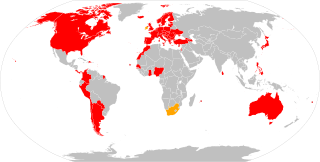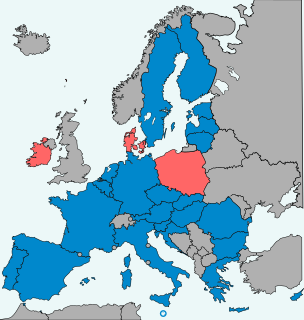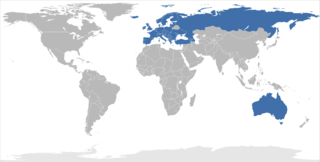
The Council of Europe is an international organisation founded in the wake of World War II to uphold human rights, democracy and the rule of law in Europe. Founded in 1949, it has 47 member states, with a population of approximately 820 million, and operates with an annual budget of approximately 500 million euros.

The European Convention on Human Rights is an international convention to protect human rights and political freedoms in Europe. Drafted in 1950 by the then newly formed Council of Europe, the convention entered into force on 3 September 1953. All Council of Europe member states are party to the Convention and new members are expected to ratify the convention at the earliest opportunity.
Extradition is an action wherein one jurisdiction delivers a person accused or convicted of committing a crime in another jurisdiction, over to the other's law enforcement. It is a cooperative law enforcement procedure between the two jurisdictions and depends on the arrangements made between them. In addition to legal aspects of the process, extradition also involves the physical transfer of custody of the person being extradited to the legal authority of the requesting jurisdiction.

The Vienna Convention on the Law of Treaties (VCLT) is an international agreement regulating treaties between states. Known as the "treaty on treaties", it establishes comprehensive rules, procedures, and guidelines for how treaties are defined, drafted, amended, interpreted, and generally operated. An international treaty is a written agreement between international law subjects reflecting their consent to the creation, alteration, or termination of their rights and obligations. The VCLT is considered a codification of customary international law and state practice concerning treaties.

The European Patent Convention (EPC), also known as the Convention on the Grant of European Patents of 5 October 1973, is a multilateral treaty instituting the European Patent Organisation and providing an autonomous legal system according to which European patents are granted. The term European patent is used to refer to patents granted under the European Patent Convention. However, a European patent is not a unitary right, but a group of essentially independent nationally enforceable, nationally revocable patents, subject to central revocation or narrowing as a group pursuant to two types of unified, post-grant procedures: a time-limited opposition procedure, which can be initiated by any person except the patent proprietor, and limitation and revocation procedures, which can be initiated by the patent proprietor only.

The European Social Charter is a Council of Europe treaty which was opened for signature on October 18, 1961 and initially became effective on February 26, 1965, after West Germany had become the fifth of the 13 signing nations to ratify it. By 1991, 20 nations had ratified it.
The UNECE Convention on Access to Information, Public Participation in Decision-making and Access to Justice in Environmental Matters, usually known as the Aarhus Convention, was signed on 25 June 1998 in the Danish city of Aarhus. It entered into force on 30 October 2001. As of March 2014, it had 47 parties—46 states and the European Union. All of the ratifying states are in Europe and Central Asia. The EU has begun applying Aarhus-type principles in its legislation, notably the Water Framework Directive. Liechtenstein and Monaco have signed the convention but have not ratified it.

The Hague Conference on Private International Law (HCCH) is an intergovernmental organisation in the area of private international law, that administers several international conventions, protocols and soft law instruments.

The Convention on the Taking of Evidence Abroad in Civil or Commercial Matters—more commonly referred to as the Hague Evidence Convention—is a multilateral treaty which was drafted under the auspices of the Hague Conference on Private International Law (HCPIL). The treaty was negotiated in 1967 and 1968 and signed in The Hague on 18 March 1970. It entered into force in 1972. It allows transmission of letters of request from one signatory state to another signatory state without recourse to consular and diplomatic channels. Inside the US, obtaining evidence under the Evidence Convention can be compared to comity.

The Convention on Road Signs and Signals, commonly known as the Vienna Convention on Road Signs and Signals, is a multilateral treaty designed to increase road safety and aid international road traffic by standardising the signing system for road traffic in use internationally.

The Convention on Cybercrime, also known as the Budapest Convention on Cybercrime or the Budapest Convention, is the first international treaty seeking to address Internet and computer crime (cybercrime) by harmonizing national laws, improving investigative techniques, and increasing cooperation among nations. It was drawn up by the Council of Europe in Strasbourg, France, with the active participation of the Council of Europe's observer states Canada, Japan, Philippines, South Africa and the United States.

The Vienna Convention on the Law of Treaties Between States and International Organizations or Between International Organizations (VCLTIO) is an extension of the Vienna Convention on the Law of Treaties which deals with treaties between States. It was developed by the International Law Commission and opened for signature on 21 March 1986.

In general, the law of the European Union is valid in all of the twenty-seven European Union member states. However, occasionally member states negotiate certain opt-outs from legislation or treaties of the European Union, meaning they do not have to participate in certain policy areas. Currently, three states have such opt-outs: Denmark, Republic of Ireland and Poland. The United Kingdom had four opt-outs before leaving the Union.

The Treaty of Lisbon is an international agreement that amends the two treaties which form the constitutional basis of the European Union (EU). The Treaty of Lisbon, which was signed by the EU member states on 13 December 2007, entered into force on 1 December 2009. It amends the Maastricht Treaty (1992), known in updated form as the Treaty on European Union (2007) or TEU, as well as the Treaty of Rome (1957), known in updated form as the Treaty on the Functioning of the European Union (2007) or TFEU. It also amends the attached treaty protocols as well as the Treaty establishing the European Atomic Energy Community (EURATOM).

The Hague Convention on the International Recovery of Child Support and Other Forms of Family Maintenance, also referred to as the Hague Maintenance Convention or the Hague Child Support Convention is a multilateral treaty governing the enforcement of judicial decisions regarding child support extraterritorially. It is one of a number of conventions in the area of private international law of the Hague Conference on Private International Law in 2007. The convention is open to all states as well as to Regional Economic Integration Organizations as long as they are composed of sovereign states only and have sovereignty in the content of the convention. The convention entered into force on 1 January 2013 between Norway and Albania, with Bosnia-Herzegovina (2013), Ukraine (2013), the European Union, Montenegro (2017), United States (2017), Turkey (2017), Kazakhstan (2017), Brazil (2017), Honduras (2017), Belarus (2018), Guyana (2020), Nicaragua (2020), United Kingdom (2021), Serbia (2021) and New Zealand (2021) following suit. Because the EU acceptance of the convention applies in 27 EU countries, the convention applies in 42 countries worldwide.
The Convention for the Suppression of Unlawful Acts against the Safety of Civil Aviation is a multilateral treaty by which states agree to prohibit and punish behaviour which may threaten the safety of civil aviation.

The Treaties of the European Union are a set of international treaties between the European Union (EU) member states which sets out the EU's constitutional basis. They establish the various EU institutions together with their remit, procedures and objectives. The EU can only act within the competences granted to it through these treaties and amendment to the treaties requires the agreement and ratification of every single signatory.

The Council of Europe Convention on Laundering, Search, Seizure and Confiscation of the Proceeds from Crime and on the Financing of Terrorism, also known as the Warsaw Convention or CETS 198, is a Council of Europe convention which aims to facilitate international co-operation and mutual assistance in investigating crime and tracking down, seizing and confiscating the proceeds thereof.

The Convention on Laundering, Search, Seizure and Confiscation of the Proceeds from Crime, also known as the Strasbourg Convention or CETS 141, is a Council of Europe convention which aims to facilitate international co-operation and mutual assistance in investigating crime and tracking down, seizing and confiscating the proceeds thereof. The Convention is intended to assist States in attaining a similar degree of efficiency even in the absence of full legislative harmony.

Extradition law in China is the formal process by which a fugitive found outside China's jurisdiction is surrendered to the jurisdiction where an alleged offense has taken place for trial or punishment, under Chinese law. China does not allow for the extradition of its own nationals.